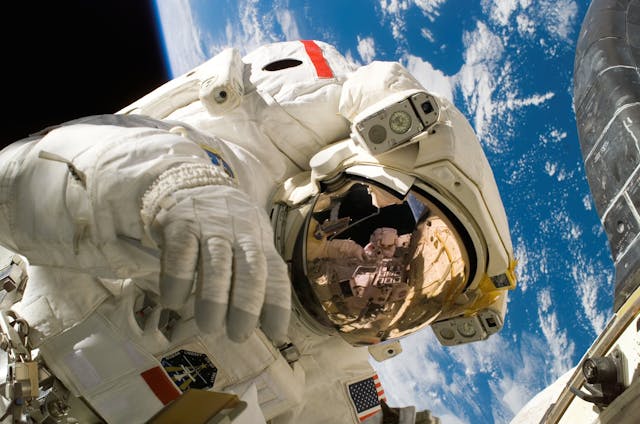
What happens to the human body in space? Astronauts in space lose bone mass and their muscles weaken. Their blood volume decreases, and their heart can shrink. They are exposed to radiation, and they may have mental changes as well.
People have only been going into space for 64 years. The first person in space was Yuri Gagarin and he flew on April 12, 1961. Since then, more people have gone up and they have stayed for longer and longer. Wikipedia says that 682 people have been to space since Yuri Gagarin. The longest time anyone has spent in space is currently 437 days by A Russian called Valeri Polyakov. Throughout his career, he spent a combined total of 22 months in space. If we do put a manned base on Mars, then presumably people will start spending longer periods of time in space. Flying at current possible speeds, it would take about 9 months to reach Mars. Then, if we start going further, it will obviously take longer. So, what happens to the human body in space?
The biggest problem is that we have evolved to live on a planet with the gravity that Earth has. All of our organs, our lungs, our heart, our brain, our muscles, even our digestive system, have evolved to function under a gravity of 1 g. If you increase or decrease that, we will have problems. If you increase it, by making a sharp loop in a fast plane, for example, blood won’t be able to get to the brain, and we will pass out or even die. If you decrease the gravity, we will also have trouble. The heart has evolved to pump blood around our veins and arteries on Earth’s gravity. If you reduce that, the heart won’t have to work as hard to move the blood, and, like any muscle, if you don’t use it, you lose it. The heart will gradually become smaller. That is fine so long as the astronaut stays in space, but when they come back to Eart,h they could have problems until the heart can grow again. Low gravity also causes fluids to accumulate in the upper body. On Earth, gravity pulls all our fluids down into our lower body, but that doesn’t happen in space. Astronauts can get swollen faces and blocked noses. They can also have digestion problems and constipation because the digestive system uses gravity to move food along the intestines. Without that, waste can easily back up.
As with the heart, all of the other muscles in the body will shrink as well. If you don’t need to use as much muscle to move your limbs, those muscles will atrophy. Astronauts have to do a lot of resistance exercise in space to keep their muscles as a reasonable level. Bone density can also decrease as well. Your bones have evolved to support your weight under Earth’s gravity, but they won’t need to be as strong in space because there isn’t as much weight to support.
People in space also often suffer a form of motion sickness. They get headaches, nausea, and they can even vomit. This is caused by the vestibular system. The vestibular system helps us balance and it sends signals to the brain about the position of our head and how we are moving. These signals are based on Earth’s gravity and in space, they send different signals. This mismatches with what the eyes are seeing and can cause motion sickness. It goes away after a few days.
Eyes are another problem. Many astronauts who spend a long time in space can develop something called spaceflight associated neuro-ocular syndrome. This is where the head of the optic nerve starts to swell, causing problems with vision. It can cause light sensitivity, difficultly seeing, and other problems like headaches and nausea. The problem doesn’t go away. It is probably caused by low pressure in the eyes, which results from the lower gravity. It is difficult to know exactly what causes it and how to cure it because as it only happens to astronauts, the sample size is very small.
Another two problems that astronauts face are radiation and psychological problems. The astronauts are shielded by the spaceship, but radiation is about 100 times stronger in space than it is on Earth because there is no atmosphere to block it. The psychological problems are a little bit harder to deal with. Astronauts can spend months stuck in a small tin box hundreds of thousands (or millions if we’re going to Mars) of km away from home and safety. If anything goes wrong, no one can help. They are also stuck there with other people. The mental pressures might end up being worse than the physical ones. And this is what I learned today.
Sources
https://humans-in-space.jaxa.jp/en/life/health-in-space/body-impact
https://en.wikipedia.org/wiki/List_of_space_travelers_by_nationality
https://www.space.com/24701-how-long-does-it-take-to-get-to-mars.html
https://en.wikipedia.org/wiki/Valeri_Polyakov
https://www.forbes.com/sites/jvchamary/2021/04/30/human-body-space-astronaut-eye
https://eyewiki.org/Spaceflight-Associated_Neuro-Ocular_Syndrome_(SANS)
Photo by Pixabay: https://www.pexels.com/photo/american-astronaut-in-space-2156/
